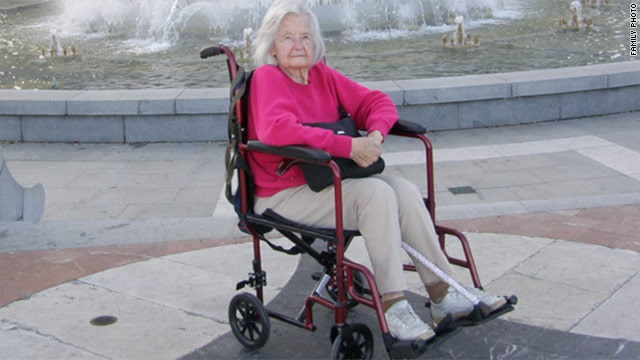Adult diaper removed for TSA
STORY HIGHLIGHTS
- A 95-year-old woman was held up by TSA officers at a Florida airport, her daughter says
- The agents forced the cancer-stricken woman to take off her adult diaper, she adds
- The TSA insists its officers "acted professionally and according to proper procedure"
- The woman's daughter says those procedures should be changed
Adult diaper removed for TSA
(CNN) -- The Transportation Security Administration stood by its security officers Sunday after a Florida woman complained that her cancer-stricken, 95-year-old mother was patted down and forced to remove her adult diaper while going through security.
Reports of the incident took hold in social media, with scores of comments on the topic and reposts appearing hourly on Twitter Sunday afternoon.
The TSA released a statement Sunday defending its agents' actions at the Northwest Florida Regional Airport.
"While every person and item must be screened before entering the secure boarding area, TSA works with passengers to resolve security alarms in a respectful and sensitive manner," the federal agency said. "We have reviewed the circumstances involving this screening and determined that our officers acted professionally and according to proper procedure."
TSA pat downs 6-year-old child
Jean Weber told CNN's Fredricka Whitfield on Sunday that the security officers may have been procedurally correct, but she still does not believe they were justified, especially given her mother's frail condition.
"If this is your procedure -- which I do understand -- I also feel that your procedure needs to be changed," she said.
Weber said the two were traveling June 18 from northwest Florida to Michigan, so her mother could move in with relatives before eventually going to an assisted living facility.
"My mother is very ill, she has a form of leukemia," Weber said. "She had a blood transfusion the week before, just to bolster up her strength for this travel."
While going through security, the 95-year-old was taken by a TSA officer into a glassed-in area, where a pat-down was performed, Weber said. An agent told Weber "they felt something suspicious on (her mother's) leg and they couldn't determine what it was" -- leading them to take her into a private, closed room.
Soon after, Weber said, a TSA agent came out and told her that her mother's Depend undergarment was "wet and it was firm, and they couldn't check it thoroughly." The mother and daughter left to find a bathroom, at the TSA officer's request, to take off the adult diaper.
Weber said she burst into tears during the ordeal, forcing her own pat-down and other measures in accordance with TSA protocol. But she said her mother, a nurse for 65 years, "was very calm" despite being bothered by the fact that she had to go through the airport without underwear.
Eventually, Weber said she asked for her mother to be whisked away to the boarding gate without her, because their plane was scheduled to leave in two minutes and Weber was still going through security.
By this weekend, the 95-year-old woman -- who was not identified by name -- was doing "fine" in Michigan, where her niece and her family "was treating her like royalty because they love her so much."
"My mother is a trouper," Weber said.
This is not the first time that the TSA's pat-downs of passengers have come under fire, nor the first time that the agency has rallied behind its officers and policy.
Last year, the administration announced it was ramping up the use of full-body scanning and pat-downs to stop nonmetallic threats, including explosives, from getting on planes. The goal is to head off attacks such as the one allegedly attempted in Christmas 2009 by Umar Farouk AbdulMutallab, who allegedly had a bomb sewn into his underwear on a flight from the Netherlands to Michigan.
The TSA estimates that only 3% of passengers are subjected to pat-downs -- and then only after they have set off a metal detector or declined to step into a full-body scanner. Yet the new policy has triggered an uproar online and in airports, from a relatively small but vocal number of travelers who feel their rights and privacy were being violated.
But the federal safety agency hasn't backed down, making some adjustments but no major changes to its policy.
"Every traveler is a critical partner in TSA's efforts to keep our skies safe," Administrator John Pistole, who ordered the new approach, said last fall. "And I know and appreciate that the vast majority of Americans recognize and respect the important work we do."
More recently, outrage erupted over a video-recorded pat-down of a 6-year-old passenger last April at New Orleans' airport. The video, which was posted on YouTube, shows the girl protesting the search by a female security officer at first, though she complies quietly while it is underway.
Pistole addressed this controversy at a Senate Homeland Security and Government Affairs Committee meeting last week, explaining the pat-down was ordered because the child had moved while passing through a body imaging machine. He told committee members that "we have changed the policy (so) that there'll be repeated efforts made to resolve that without a pat-down."
The next day, TSA spokesman Greg Soule said that the new policy -- which will apply to children age 12 and younger -- is in the process of being rolled out. It will give security officers "more options," but does not eliminate pat-downs as one of them.
"This decision will ultimately reduce -- though not eliminate -- pat-downs," Soule said.


No comments:
Post a Comment